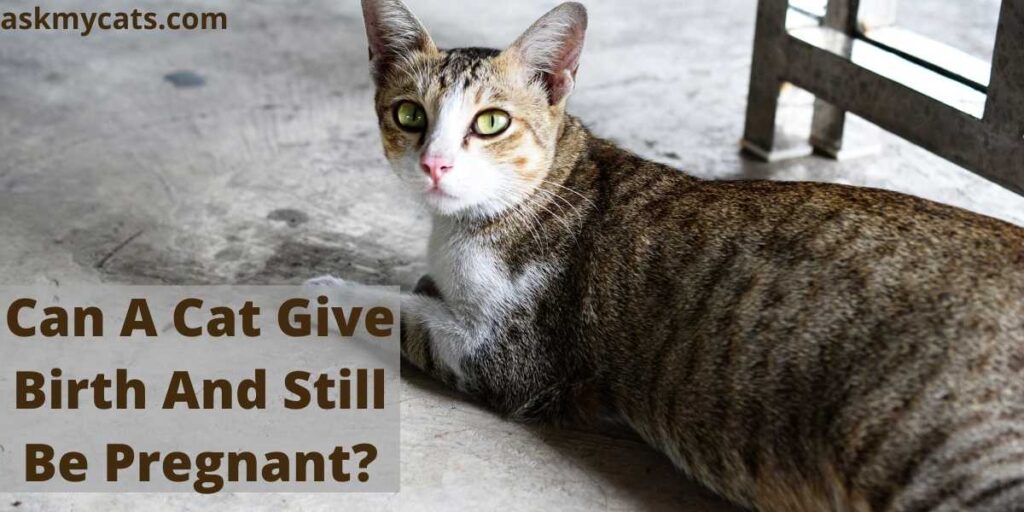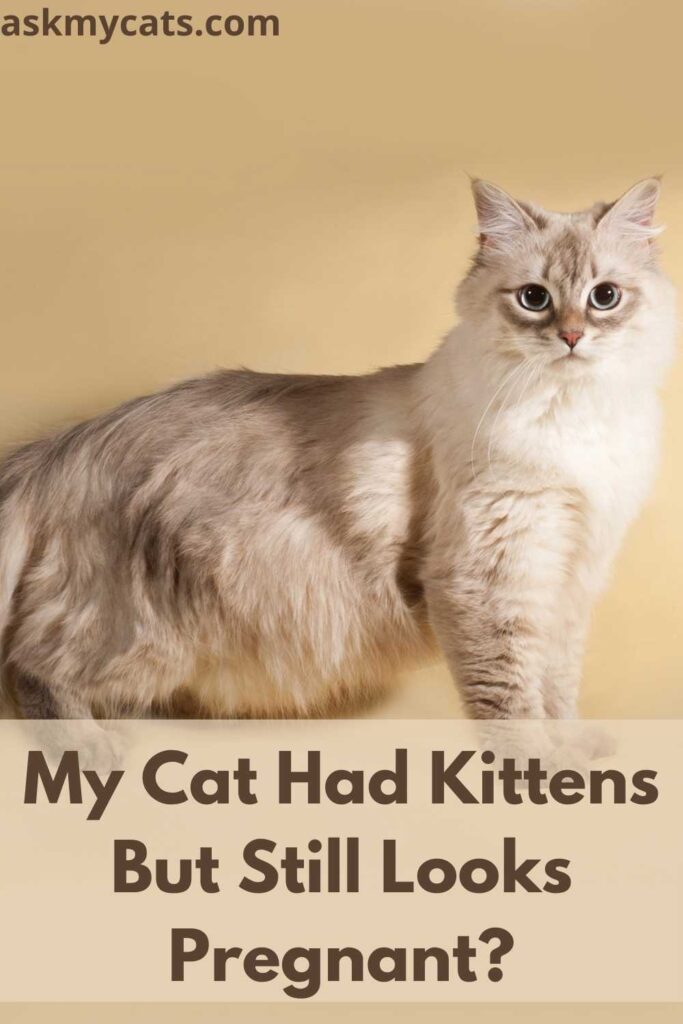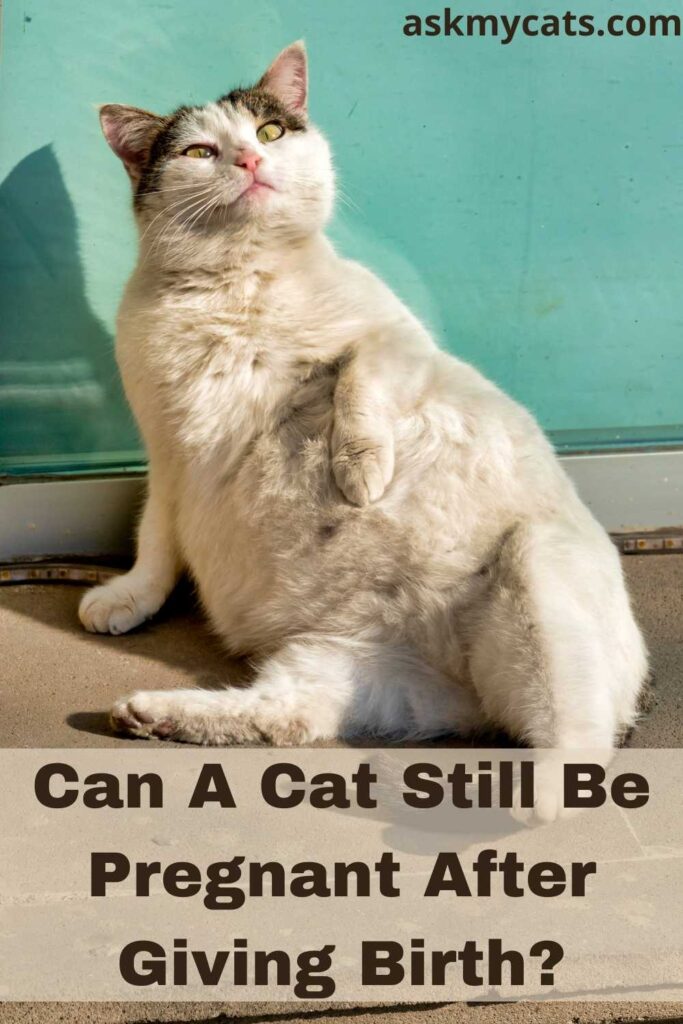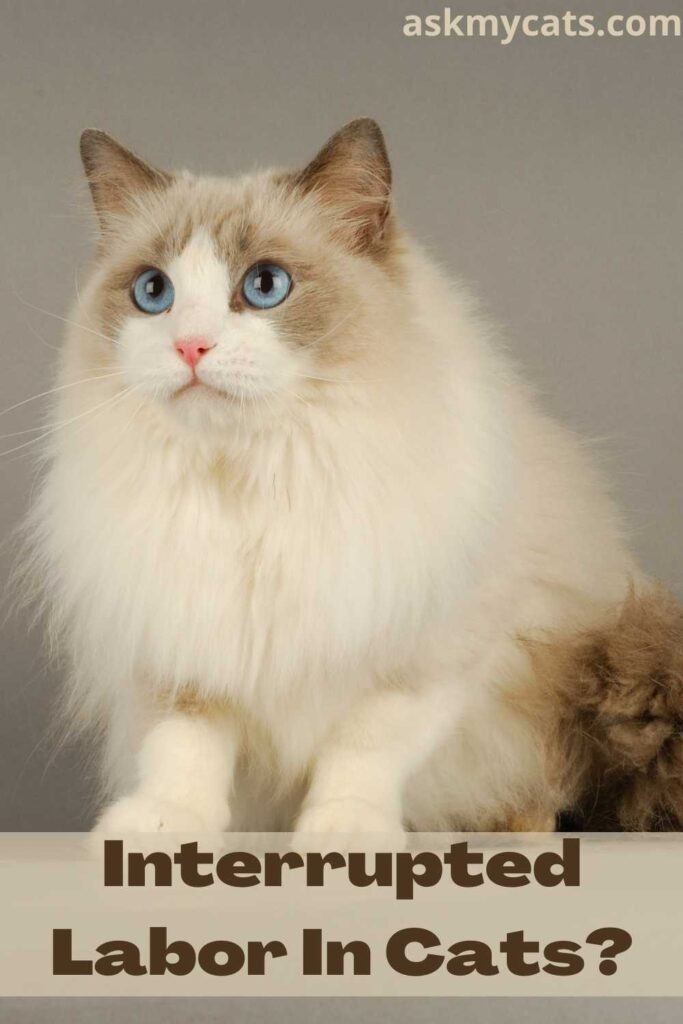When you’re caring for a cat that’s expecting kittens, it’s natural to be excited. A pregnant cat, after all, means kittens are on the way, and who doesn’t enjoy a lovely litter of kittens?
Of course, when it comes to the actual birth, pet parents expecting cats are likely to have a lot of questions.
One such question is, can a cat give birth and still be pregnant?
Yes, cats can give birth and still be pregnant. Some cats will also go into labor, give birth to multiple kittens, and then wait a long time before giving birth to another kitten. Cats can have stopped labor in rare situations, resulting in two separate birthdays for the same litter of kittens.
Keep reading this article to know why this phenomenon happens and if your cat is safe.


Give Your Cat the Perfect Day
Get the Free Ebook!
My Cat Had Kittens But Still Looks Pregnant?
The reason why your cay still looks pregnant after having kittens could be that more kittens are on the way.

Interrupted labor is so prevalent in cats that it’s considered a normal occurrence.
When one or more kittens are delivered, the mother will stop struggling and rest comfortably, nursing the ones that have already been born.
She accepts food and drink and appears to be normal in every way except for the fact that her size and shape, as well as the existence of fetal activity, indicate that there are still kittens waiting to be born.
If the owner has to leave the house, some of the most dependent cats will purposefully delay or halt labor.
This resting period can extend up to 24 or even 36 hours, following which straining resumes, and the rest of the litter is born normally and without difficulty.
Birth is particularly stressful for your cat’s body, and there could be a solid reason if she isn’t naturally laboring.
When it comes to a cat giving birth, birthdays aren’t the only thing to be concerned about. Here are a few more things to think about.
Also, check out What To Expect While Cat Giving Birth For The First Time?
Can A Cat Still Be Pregnant After Giving Birth?
Yes, a cat can still be pregnant after giving birth.

Even after a cat gives birth, it might still be pregnant.
Momma cats don’t always give birth to their entire litter at once, which might be perplexing.
They may not even go into labor for the next kitten soon after the first, resulting in extended delivery durations and a pregnant cat between babies.
This means that you must keep an eye on mother cats as they give birth.
They may not be comfortable with you being in the room the entire time, but you should check on them frequently to see where they are in the birth process, how many kittens they’ve had, and if they appear to have any more kittens on the way.
Monitoring during birth is also important because cats can have birthing problems that require veterinary attention, and kittens can be born with health issues.
Unfortunately, some kittens may be stillborn, which can upset their mothers and cause problems for the rest of the litter.
The sooner you identify any issues or complications with your pregnant cat, the more likely you are to be able to receive her and her baby’s potentially lifesaving treatment.
Most of the time, cats give birth to their kittens and everything is well, but every now and then, a cat’s labor will be interrupted, and not all of the kittens will be delivered at the same time.
Mama cats may also have birthing problems in which one of the kittens becomes stuck, which is extremely dangerous for both the momma cat and her kittens, so knowing what to look for is crucial.
A kitten that is still in the womb cannot normally be seen, and its mother may not show any signs of distress.
You can check for kittens by gently pushing on your cat’s belly; any kittens still in her womb will be felt as little lumps.
You might also like to read about how to tell if cat still has kittens inside
If a mother cat is having trouble giving birth, she will usually display signs of distress. They’ll probably start licking their behinds and weep or appear worried.
Some cats will even run around as if they’re having fun or are terrified. If your cat exhibits any of these symptoms, contact a veterinarian straight once.
An emergency vet should be able to coach you through the next few minutes so you can assist your cat while another vet arrives.
A kitten’s paw or nose, for example, may be visible before it is born. If this occurs, your cat must give birth as soon as possible to ensure the health of both mother and kid.
At this point, your kitten should be delivered in a matter of minutes, but if it takes longer than that, you should contact a veterinarian.
Interrupted Labor In Cats?
Here are some reasons for interrupted labor in cats.

1. Your Cat Needs To Rest
When your cat gives birth to one or more kittens and then stops, it’s not always something you should be concerned about right away.
If a queen (the official title for a pregnant cat) feels overwhelmed or fatigued, she may take a break during labor.
It’s fairly typical for cats to “pause” while they’re pregnant.
She might wish to eat or drink something during this period.
Make sure there’s food and water close by so she doesn’t have to leave her kittens.
She may also breastfeed the new kittens before giving birth to the remainder of the litter. Usually, a pause in labor lasts no longer than 24 to 36 hours.
While it’s unclear why cats might take a break during the birthing process, the queen might simply require some rest.
She may also be stressed or overwhelmed by the situation, particularly if this is her first time giving birth.
If your cat stops eating for more than a few hours, it’s a good idea to check with your veterinarian to make sure everything is fine.
2. Something Changed
While giving birth, cats may be more dependent or independent. When they start to go into labor, a more independent cat may try to hide.
They’ll be most at ease in a towel-lined box or another secluded spot inside a closet or private room.
If you try to approach your cat and she appears uncomfortable or aggressive, she could be in labor, and she may want to do it alone.
While you should certainly check in on her from time to time, allow a queen who wishes to give birth alone some space.
On the other hand, some cats are quite reliant on their humans during the birthing process. They’ll most likely find a comfortable place to give birth nearby.
Some cats prefer to have their kittens in their owners’ beds, especially if the bed is already a favorite hangout spot for them.
These are also the cats who will bring their kittens to you once they are born!
If your cat is a clingy kind, she’ll want to stay near you during giving birth. She might like it if you pet her or if she snuggles against you with her head.
If she goes into labor, cats who are more dependent may put the delivery on hold and wait for you to return.
While you may not always be able to rearrange your schedule if she has kittens on separate days, you should try to attend if at all feasible.
If you are unable to attend, someone else who is familiar with your cat should be present in case of complications during the delivery.
3. Kitten Stuck In-Birth Canal
If you observe a paw, the head, or the tail of a kitten in the delivery canal, you should expect the kitten to be born within the following few minutes.
This is true for all kittens save the first, which may require a little extra pushing as it expands the birth canal for its siblings.
A mechanical blockage or uterine inertia are the two most common causes of a kitten becoming stuck.
When the kitten is in an incorrect birthing position, a mechanical blockage occurs. The smallest part of the body (not the head) comes out first when a kitten is born with its feet and tail first.
This makes it more difficult for the mother to move the kittens forward. Kittens are often delivered in a “diving” position, which means head and feet first, in a healthy delivery. A blockage can also occur if the head is displaced or forced to the side.
When a kitten becomes stuck due to unsuccessful uterine inertia, the mother usually experiences a problem that makes it difficult for her to push the kitten out through the birth canal because her contractions are insufficient.
This is more likely to occur in large litters or if the mother is particularly tiny. This problem could be caused by previous fractures, uterine deformation, or even an excess of amniotic fluid.
Finally, a kitten’s head may become stuck in the birth canal due to its size. This is most common in Persian and Siamese cats, which have huge, distinctive heads.
While most breeds have a risk of dystocia of 3-6 percent, some felines have a substantially higher risk.
Interesting Read: How Long Does It Take For A Cat To Give Birth After Her Water Breaks?
Can Cats Give Birth Days Apart?
Yes, cats can give birth days apart.
Cats have the ability to give birth 24 hours apart. It’s unlikely that two kittens would be born exactly 24 hours apart, but it’s not impossible.
Cats can experience interrupted labor, in which they begin to labor for a kitten and then stop.
Interrupted labor can occur before any kittens have entered the birth canal. Interrupted labor is more likely to occur after your cat has already given birth to at least one kitten in her litter.
Interrupted labor is typical and nothing to be concerned about unless your cat displays signs of suffering or excessive exhaustion.
Simply keep a watch on your cat and be prepared to take her to the clinic if she displays any indications of distress, irregular bleeding, or other birth issues.
She’ll probably go into labor again on her own and deliver the remainder of the kittens when she’s ready.
How Far Apart Can Kittens Be Born?
Kittens can be born as far apart as 24-36 hours.
Cats with interrupted labor have had kittens up to 36 hours apart, although this is unusual. Cats have an average litter size of four kittens, and most kittens are born within 10 minutes to an hour of each other.
Of course, cat litters can contain up to 12 kittens, and in some situations, interrupted labor might result in extended gaps between births.
Must Read: Can A Nursing Cat Get Pregnant?
Frequently Asked Questions
What should I do if my cat stops pushing during labor?
You won’t be able to do anything at home to assist your cat in pushing during delivery. Putting pressure on her or attempting to coax the kitten out could cause more harm than good. You should also avoid pulling on a kitten that appears to be stuck because you risk injuring your cat or the unborn kitten. If the kitten is born headfirst, one thing you can do is brush away the membranes covering the kitten’s nose and mouth, especially if the mother is taking a long time to push. This allows the kitten to breathe while the remainder of her body travels through the birth canal.
Will my cat’s diet need to be changed during pregnancy?
The queen’s nutrient requirements will increase to one-and-a-half times their pre-pregnancy level during pregnancy. It may reach twice the pre-pregnancy level by the time you wean. It will be necessary to increase the number of meals served and feed a diet designed for pregnant females or kittens, as this will provide the extra nutrients needed for pregnancy and nursing.
What preparations are needed before my cat has her kittens?
The kittening bed can come in a variety of shapes and sizes, but a cardboard box lined with newspaper, old sheets, or towels is the best option. The bed should be warm, comfortable, and secluded, but it should also be visible.
Final Words
Even when delivering the same litter of kittens, cats can give birth days apart. This happens for a variety of reasons, including the fact that cats can “pause” their birth for up to 36 hours. In the majority of the cases, there is nothing to worry about.
However, pausing during delivery can, however, be triggered by a major condition. It’s crucial to pay attention to your cat’s behavior during the birth process and look for signals if something is amiss.
A kitten blocked in the birth canal, pushing or straining without a kitten being born, or new blood is all possibilities.
If something is wrong with your cat, its attitude is likely to change as well. They may appear worried, lick the region, or cry excessively.
While most kitten deliveries happen without a hitch, it’s vital to be aware of the warning signs so you can contact your veterinarian for help if something goes wrong.
If you have any questions, ask us in the comments section.

My cat had one kitten and then paused her labour now for six days, she is not stressed and act normal, i can feel kittens maybe 2 more inside her . Must i be concernd
First of all, congratulations.
Regarding your query, I highly suggest you to consult with your vet to eliminate any possibility of unborn kittens.
Happy Cat Parenting